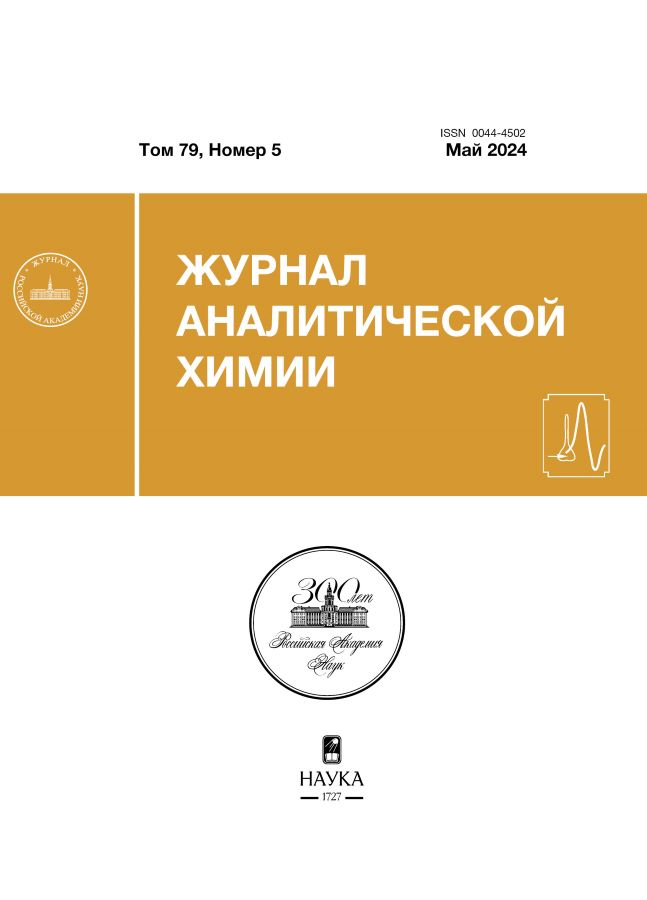Flotation extraction of copper and zinc ions with N-nonanoyl-N’-methanesulfonylhydrazine
- 作者: Vaulina V.N.1, Chekanova L.G.1, Mulyukova A.B.1, Kharitonova A.V.1
-
隶属关系:
- Institute of Technical Chemistry, Ural Branch, Russian Academy of Sciences
- 期: 卷 79, 编号 5 (2024)
- 页面: 486-494
- 栏目: ORIGINAL ARTICLES
- ##submission.dateSubmitted##: 31.01.2025
- URL: https://rjpbr.com/0044-4502/article/view/650220
- DOI: https://doi.org/10.31857/S0044450224050077
- EDN: https://elibrary.ru/usyuzp
- ID: 650220
如何引用文章
详细
The patterns of concentrating Cu(II) and Zn(II) ions from aqueous solutions with N-nonanoyl-N’-mesylhydrazine by the ion flotation method were studied, depending on the initial concentration of the collagents, the pH value of the solution, conditioning time, and temperature. Based on IR spectroscopy and elemental analysis data, a hypothesis about the composition of the floated compounds was made. It was shown that the extraction of Zn(II) is significantly dependent on the initial concentration of the metal and the conditioning time of the solution. A decrease in the extraction degree of the studied ions with an increase in the solution temperature was established, with this effect being more pronounced for Cu(II). The kinetics of the process were described using the classical first-order model; the obtained flotation rate constants for Zn(II) ions were five times higher than for Cu(II). The conditions for the selective separation of Cu(II) ions in collective flotation conditions were determined.
全文:
作者简介
V. Vaulina
Institute of Technical Chemistry, Ural Branch, Russian Academy of Sciences
Email: larchek.07@mail.ru
俄罗斯联邦, 614013 Perm
L. Chekanova
Institute of Technical Chemistry, Ural Branch, Russian Academy of Sciences
编辑信件的主要联系方式.
Email: larchek.07@mail.ru
俄罗斯联邦, 614013 Perm
A. Mulyukova
Institute of Technical Chemistry, Ural Branch, Russian Academy of Sciences
Email: larchek.07@mail.ru
俄罗斯联邦, 614013 Perm
A. Kharitonova
Institute of Technical Chemistry, Ural Branch, Russian Academy of Sciences
Email: larchek.07@mail.ru
俄罗斯联邦, 614013 Perm
参考
- Doyle F.M. Ion flotation – Its potential for hydrometallurgical operations // Int. J. Miner. Process. 2003. V. 72. № 1–4. P. 387. https://doi.org/10.1016/S0301-7516(03)00113-3
- Гольман А.И. Ионная флотация. М.: Недра, 1982. 144 с.
- Grieves R.B. Foam Separations: A Review // Chem. Eng. J. 1975. V. 9. № 2. P. 93. https://doi.org/: 10.1016/0300-9467(75)80001-3
- Sebba F. Ion Flotation. New York: Elsevier, 1962. 180 р.
- Lazaridis N.K., Peleka E.N., Karapantsios Th.D., Matis K.A. Copper removal from effluents by various separation techniques // Hydrometallurgy. 2004. V. 74. P. 149. https://doi.org/:10.1016/j.hydromet.2004.03.003
- Stoica L., Oproiu G.C. Cu(II) Recovery from aqueous systems by flotation // Sep. Sci. Technol. 2005. V. 39. № 4. Р. 893. https://doi.org/10.1081/ss-120028452
- Lobacheva O.L. Ion flotation of ytterbium water-salt systems — An innovative aspect of the modern industry // Water. 2021. V. 13. № 24. https://doi.org/10.3390/w13243493
- Dzhevaga, N. Lobacheva O. Reduction in technogenic burden on the environment by flotation recovery of rare earth elements from diluted industrial solutions // Applied Sciences. 2021. V. 11. № 16. https://doi.org/10.3390/app11167452
- Hoseinian F.S., Irannajad M., Nooshabadi A.J. Ion flotation for removal of Ni(II) and Zn(II) ions from wastewaters // Int. J. Miner. Process. 2015. V. 143. P. 131. https://doi.org/10.1016/j.minpro.2015.07.006
- Mohammed A.A., Ebrahim S.E., Alwared A.I. Flotation and sorptive-flotation methods for removal of lead ions from wastewater using SDS as surfactant and Barley Husk as biosorbent // J. Chem. 2013. V. 6. P. 1. https://doi.org/10.1155/2013/413948
- Zakeri Khatir M., Abdollahy M., Khalesi M.R., Rezai B. Selective separation of neodymium from synthetic wastewater by ion flotation // Sep. Sci. Technol. 2021. V. 56. № 10. Р. 1802. https://doi.org/10.1080/01496395.2020.1793779
- Otero-Calvis A., Ramírez-Serrano B., Coello-Velazquez A. Selectivity in the flotation of copper with xanthate over other ions present in wastewater: An experimental and computational study // J. Mol. Graph. Model. 2020. V. 98. https://doi.org/10.1016/j.jmgm.2020.107587
- Радушев А.В., Чеканова Л.Г., Чернова Г.В. Реагенты для ионной флотации цветных металлов (Обзор) // Цветные металлы. 2005. № 7. С. 34.
- Soliman M.A., Rashad Gh.M., Mahmoud M.R. Kinetics of ion flotation of Co(II)–EDTA complexes from aqueous solutions // Radiochim. Acta. 2015. V. 103. № 9. P. 643. https://doi.org/10.1515/ract-2015-2390
- Svanedal I., Boija S., Norgren M., Edlund H. Headgroup interactions and ion flotation efficiency in mixtures of a chelating surfactant, different foaming agents, and divalent metal ions // Langmuir. 2014. V. 30. № 22. P. 6331. https://doi.org/10.1021/la500689n
- .Liu Z., Doyle M.F. Ion flotation of Co2+, Ni2+, and Cu2+ using dodecyldiethylenetriamine (Ddien) // Langmuir. 2009. V. 25. № 16. P. 8927. https://doi.org/10.1021/la900098g
- Стрельцов К.А., Абрютин Д.В. Исследование закономерностей процесса ионной флотации меди с использованием диэтилдитиокарбамата натрия // Изв. ВУЗов. Цветная металлургия. 2010. № 2. С. 3. (Strel’tsov K.A., Abryutin D.V. Investigation of regularities of ion flotation of copper with the use of sodium diethyldithiocarbamate. Russ. J. Non-Ferrous Met. 2010. V. 51. № 2. P. 85. https://doi.org/10.3103/S106782121002001X
- Радушев А.В., Чеканова Л.Г., Гусев В.Ю. Гидразиды и 1,2–диацилгидразины. Получение, свойства, применение в процессах концентрирования металлов. Екатеринбург: Уральский центр академического обслуживания, 2010. 146 с.
- Чеканова Л.Г., Радушев А.В., Воронкова О.А., Байгачева Е.В., Алехина Ю.В. Извлечение ионов цветных металлов из аммиачных растворов с N-ацил-N'-(п-толуолсульфонил)гидразинами // Химическая технология. 2011. № 12. С. 754.
- Chekanova L.G., Vaulina V.N., Elchischeva Yu.B., Bardina E.S., Pavlov P.T. The selection of reagents for ionic flotation of non-ferrous metals in the series of N-acyl-N'-mezylhydrazines // Bull. Univ. Karaganda Chem. 2022. V. 108. № 4. P. 171. https://doi.org/ 10.31489/2022Ch4/4-22-13.
- Овербергер Ч. Дж., Ансели Ж-П., Ломбардино Дж. Г. Органические соединения со связями азот-азот. Л.: Химия, 1970. 123 с.
- Stoica L., Oproiu G.K., Cosmeleata R., Dinculescu R, Dinculescu M. Kinetics of Cu2+ separation by flotation // Sep. Sci. Technol. 2003. V. 38. № 3. Р. 613. https://doi.org/10.1081/SS-120016654
- Булатов М. И. Примеры теоретических расчетов в химическом анализе: учебное пособие. Л.: ЛТИ, 1972. 202 с.
- Лурье Ю. Ю. Справочник по аналитической химии. М.: Книга по Требованию, 2012. 440 с.
补充文件


















